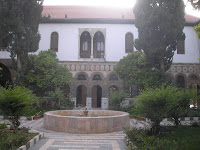
Anyway, May 25th is the date in 1946 when the region known as Transjordan that operated under a British mandate became legally independent from the UK and changed its name to the Hashemite Kingdom of Jordan.
Unlike other countries where I have lived - where this kind of a date is solidly cemented in popular culture - it wasn't until last Wednesday that an e-mail message went out to the staff team to let us know that today - Tuesday - was going to be off work.
It is understandable to me that I didn't know this was a holiday - living in my foreigner bubble daze. What is interesting to me is that my colleagues also didn't really seem to know until the last minute that there would be a day off. And, as it turns out, the scheduling was a bit of a bother and messed up a final deadline we have been working towards. And people are upset about that. And other people are upset that the first group is upset. And so it goes. The agitation certainly could have been avoided if only we had known earlier that a national holiday had been scheduled and we would have planned for it. Which seems like a ridiculous thing to observe, but there you have it: a cultural insight.
I guess this low-key recognition of the date accounts for the extremely low-key way it is being celebrated. Or rather not celebrated. It is sunny and hot today and the town is completely quiet, like a regular Friday weekend day. The only thing I have seen out of the ordinary was a lone convoy of stretch limos around noon. They were followed by a couple of pick up trucks and taxi drivers honking their horns and flying those car flags you see after a soccer team wins. Maybe 10 cars in total. My hometown of Deep River, population 4,000, puts on a bigger celebration for Canada Day. Maybe the celebrations start up after dark? I will wait and see. (Fireworks, by the way, are a regular occurrence these days. Big displays every Thursday and Friday night, accompanied by lots of gunfire from the tops of the hills that circle the old downtown. Wedding season!)








